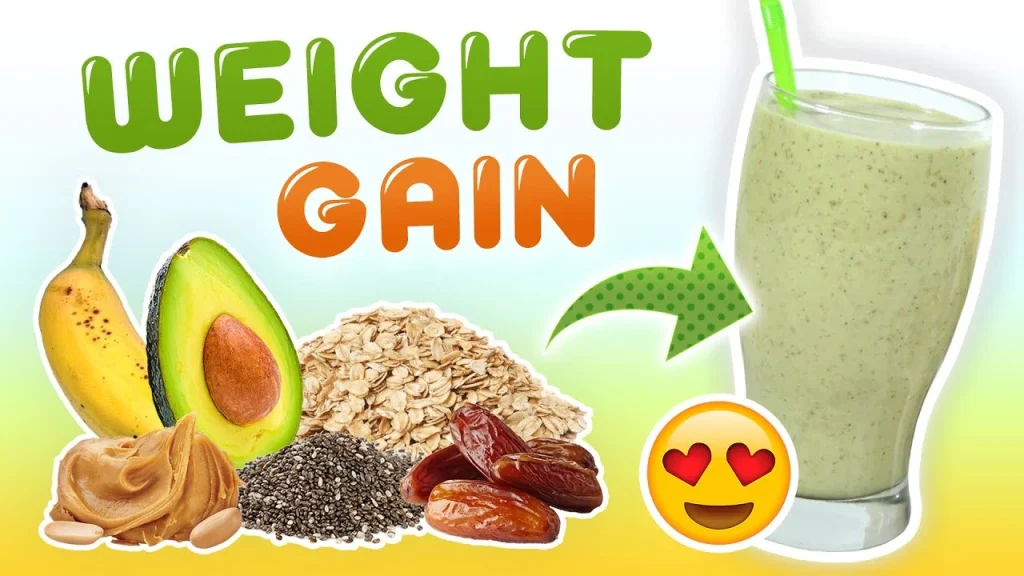
Foods for Weight Gain in Elderly | Top Snacks & Main Dishes Ideas
What are the best foods for weight gain in elderly and what are the main food groups they consist of? Although obesity is the most common nutritional problem in young and middle-aged people, the main problem in the elderly is weight loss. Studies have shown that insufficient diet, low body mass index, decreased arm circumference, and decreased albumin are related to hip fracture.
Losing weight, even when done voluntarily, increases the risk of hip fracture. Underweight or a body mass index of less than 21 increases the risk of infection, mortality, repeated intubations when necessary, and decreased performance in the elderly. Of course, low BMI can result from high or low metabolism in the body. performance in the elderly. Of course, low BMI can result from high or low metabolism in the body.
Malnutrition in the elderly has numerous adverse effects, including pressure ulcers, infections, hip fractures, cognitive abnormalities, anemia, muscle weakness, fatigue, edema, and mortality. In addition, malnutrition weakens the immune system and reduces immune responses to infections.
For this reason, we have dedicated this article from the humanhealthmag to the topic of foods for weight gain in elderly. We have also examined the nutrition of the elderly and the best diet for them. Finally, we will provide a list of suitable foods for breakfast, lunch and dinner so that the elderly companion, family and nurse can take serious steps for the health of the elderly with the help of this list.
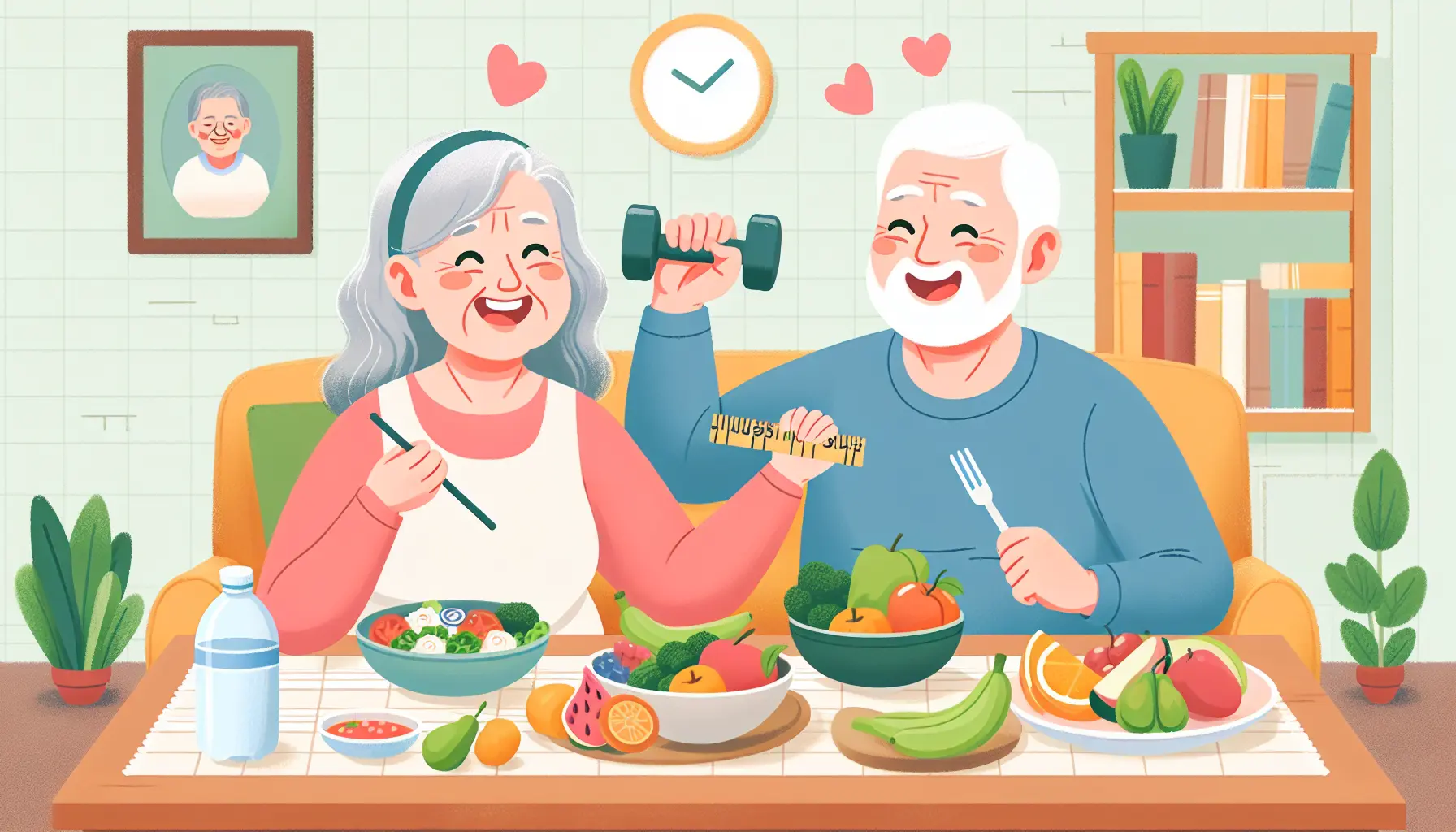
How to Plan Foods for Weight Gain in Elderly
Planning foods for weight gain in elderly requires precision and attention to the special needs of this age group. Over time, physiological changes occur in the body that may affect appetite, digestion, and absorption of nutrients.
- Diversity in elderly nutrition
A senior’s diet should include a variety of foods, including fruits, vegetables, whole grains, lean proteins (such as chicken, fish, and beans), and low-fat or fat-free dairy products. Diversity in elderly nutrition helps to provide vitamins and minerals needed by the body.
- Adequate protein
As we age, maintaining strong and healthy muscles is very important. Consuming protein sources such as eggs, fish, chicken and legumes are very important in the diet of the elderly.
- High fiber intake
To prevent digestive problems, constipation and improve digestion, seniors should get enough fiber from sources such as vegetables, fruits, and whole grains. Consuming whole grain breads, brown rice and oats are among the suitable options.
- Control the amount of salt and sugar
Reducing the consumption of salt and sugar in the diet of the elderly can help maintain the blood pressure of the elderly and healthy blood sugar levels. Instead of processed foods and sweets, use natural and low-fat foods.
- Hydration
Adequate intake of water and fluids is very important. Elderly people may feel less thirsty, but they should drink water regularly to avoid dehydration. Consuming water, herbal teas and low-salt soups can be helpful.Soup is one of the best fast food for no teeth seniors.
- Vitamins and supplements
If needed, you can add vitamin D, calcium and vitamin B12 supplements to the diet of the elderly in consultation with the doctor to meet the special nutritional needs of the elderly.
Foods for Weight Gain in Elderly
What foods help the elderly gain weight? Healthy eating for older adults should include diverse and nutrient-rich foods. Some useful foods for the elderly that do not cause excessive obesity in the elderly include:
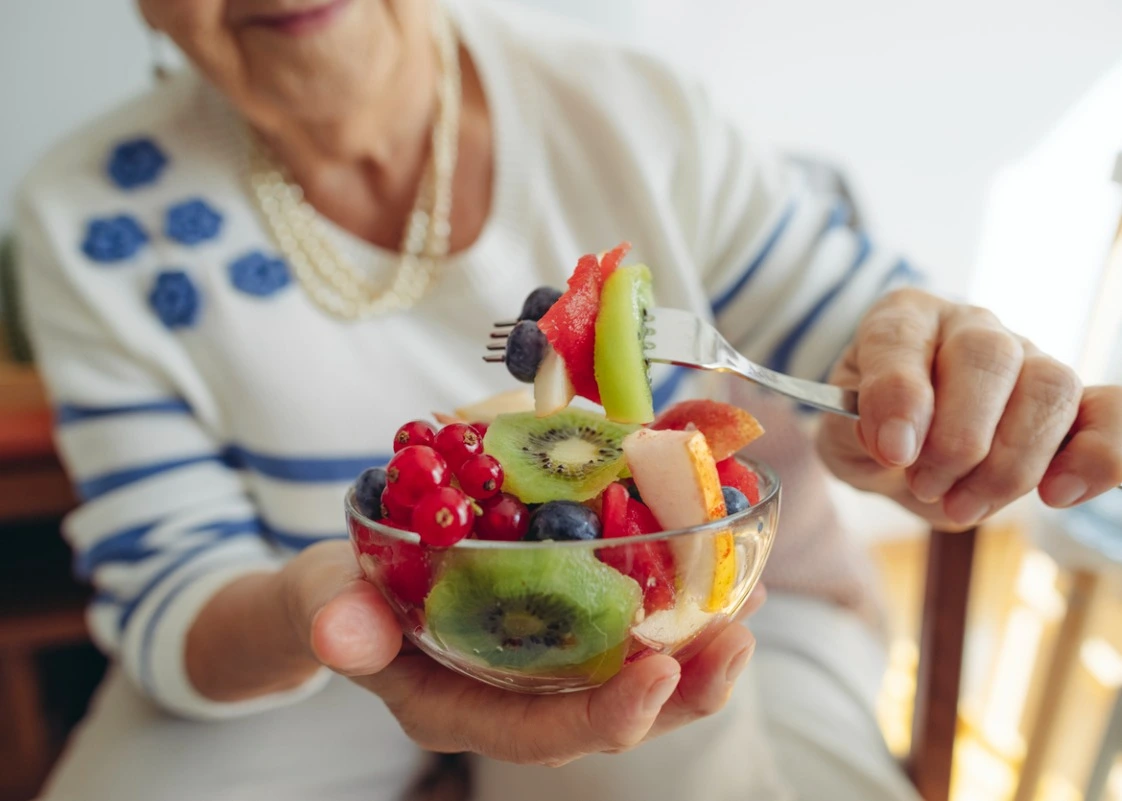
Healthy Snacks for Seniors
- Fresh fruits and vegetables
These foods for weight gain in elderly are considered a very suitable snack for the elderly due to the presence of vitamins, minerals, fiber and antioxidants. These nutrients can strengthen the immune system, improve digestion and reduce the risk of chronic diseases. Recommended fruits include apples, bananas, strawberries, blueberries, avocados, oranges, and grapefruit.
- Whole grains
Whole grain breads, oats and brown rice are good sources of fiber and B vitamins. These foods are rich in fiber, vitamins and minerals and help control blood sugar, improve digestion and reduce the risk of heart disease.
- Low-fat proteins
Skinless chicken, fish, eggs and low-fat dairy are excellent sources of protein. Fish, especially types that are rich in omega-3 fatty acids, such as salmon, trout, and sardines, are among the most useful sources for feeding the elderly. Having high quality protein, vitamin D and choline, eggs help strengthen muscles, improve memory and reduce inflammation.
- Low-fat dairy
Yogurt, milk, and low-fat cheese are good sources of calcium, protein, and vitamin D, which help maintain bone health and can make you feel fuller.
- Legumes
Legumes are another food for weight gain in the elderly. These ingredients are rich in protein, fiber, vitamins, and minerals that can help lower cholesterol, control blood sugar, and improve heart health.
- Nuts and seeds
Nuts and seeds are rich sources of healthy fats, protein, fiber and B vitamins and can help provide healthy fats and protein. Regular and small amounts of nuts such as almonds, walnuts, pistachios, hazelnuts, peanuts, sunflower seeds, and pumpkin seeds can be effective in reducing the risk of heart diseases, controlling blood sugar, and improving brain function.
The Best Breakfast Ideas for Underweight Seniors
Breakfast is one of the most important meals that provide energy and nutrients to start the day. A healthy breakfast for the elderly can prevent the lack of nutrients in the elderly body and include the following foods:
- Oatmeal with fresh fruits and nuts: Oats are rich in fiber and B vitamins, and fresh fruit and nuts help provide vitamins and healthy fats.
- Boiled or half-boiled eggs: Eggs are a good source of protein and vitamin D.
- Low-fat yogurt with dried fruits: Low-fat yogurt helps provide calcium and probiotics, and dried fruits help increase dietary fiber.
- Whole grain bread with low-fat cheese: Whole grain bread rich in fiber and low-fat cheese are good sources of protein and calcium.
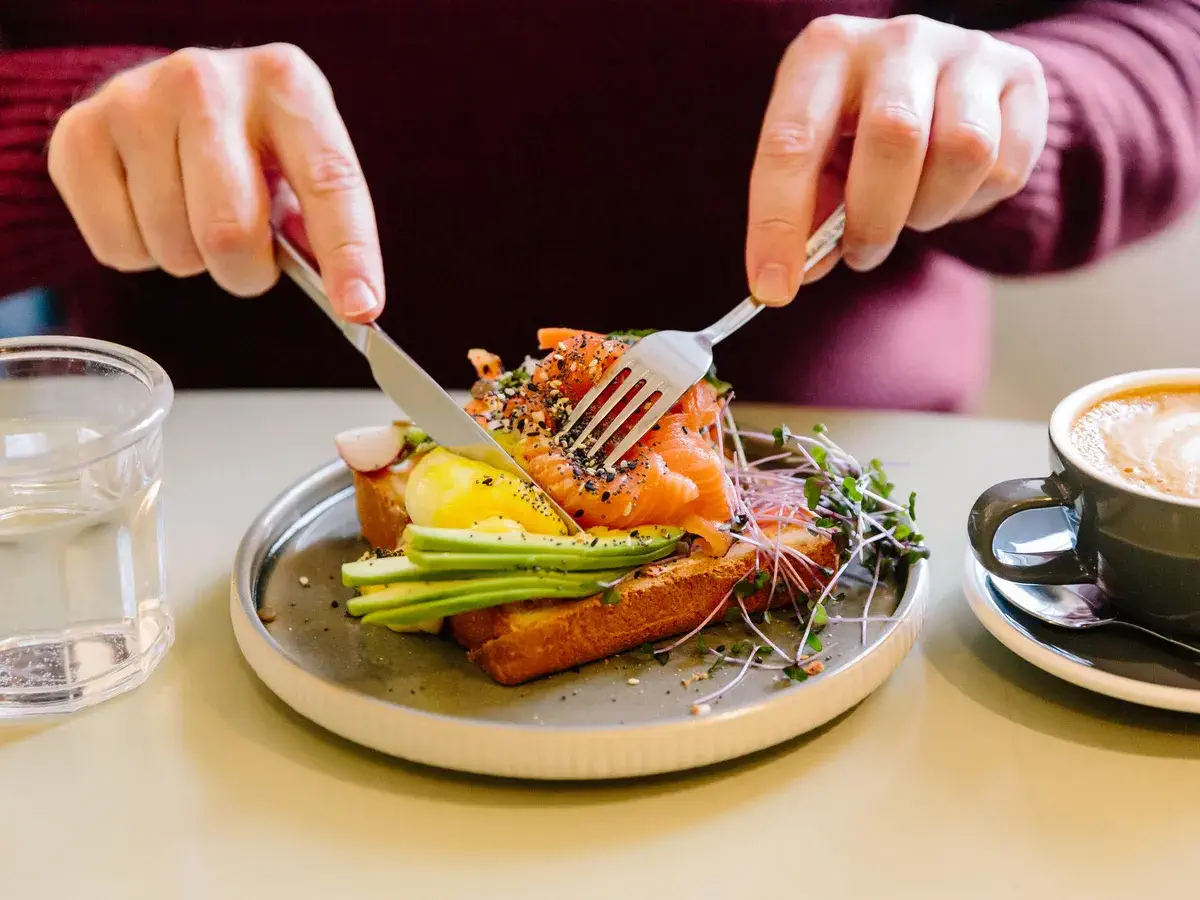
The Best Lunch Ideas for Skinny Seniors
Lunch should contain varied and nutrient-rich foods to provide energy and nutrients needed to continue the day. The type of diet even has an effect on hunger hormones. Some good options for a slim senior lunch are:
- Fresh vegetable salad with grilled chicken: This salad contains vitamins, minerals and low-fat protein.
- Vegetable soup with whole grain bread: Vegetable soup is low in calories and high in fiber, and whole-wheat bread helps provide complex carbohydrates.
- Grilled fish with brown rice and steamed vegetables: Fish is a good source of protein and omega-3 fatty acids, and brown rice and steamed vegetables help provide fiber and vitamins.
- Lentil Rice with fresh vegetables: Lentils are a good source of plant-based protein and fiber, and fresh vegetables help boost vitamins and minerals.
Top Dinner Ideas to Help Seniors Gain Weight
Dinner should be light and contain low-calorie foods rich in nutrients. Some good options for dinner for seniors who like to gain weight include:
- Chicken and vegetable soup: This soup is light and low-calorie and helps provide protein and fiber.
- Lettuce salad with tuna and peas: This salad contains protein, fiber and various vitamins.
- Steamed vegetables with low-fat cheese: This combination is rich in vitamins and minerals, and low-fat cheese helps provide protein and calcium.
- Boiled eggs with whole grain bread and fresh vegetables: This meal is light and contains protein and fiber.
The Best Times to Eat Foods for Weight Gain in Elderly
After introducing foods for weight gain in elderly, you should know that proper timing of eating is very important for the elderly, as it can have many positive effects on digestion, blood sugar control, and prevention of constipation. When seniors eat their meals at regular times, their digestive system works more efficiently and digestive problems such as bloating, indigestion, and constipation occur less often.
This is especially critical for seniors who struggle with conditions such as diabetes, as regular mealtimes help control blood sugar levels and prevent sudden fluctuations. In addition, eating light meals early in the evening can have a significant impact on the quality of sleep in the elderly, and prevent sleep problems.
To set up a suitable meal plan for the elderly, it is recommended to eat meals regularly and at certain times of the day. This not only helps to adjust the body’s internal clock, but also improves digestion. For example, starting the day with a complete breakfast that contains a combination of protein, carbohydrates, and fiber provides the necessary energy for daily activities and helps maintain a stable energy level throughout the day.
On the other hand, at the end of the day, eating a light meal that is eaten a few hours before going to bed can help improve the quality of sleep for the elderly and prevent digestive problems during the night.
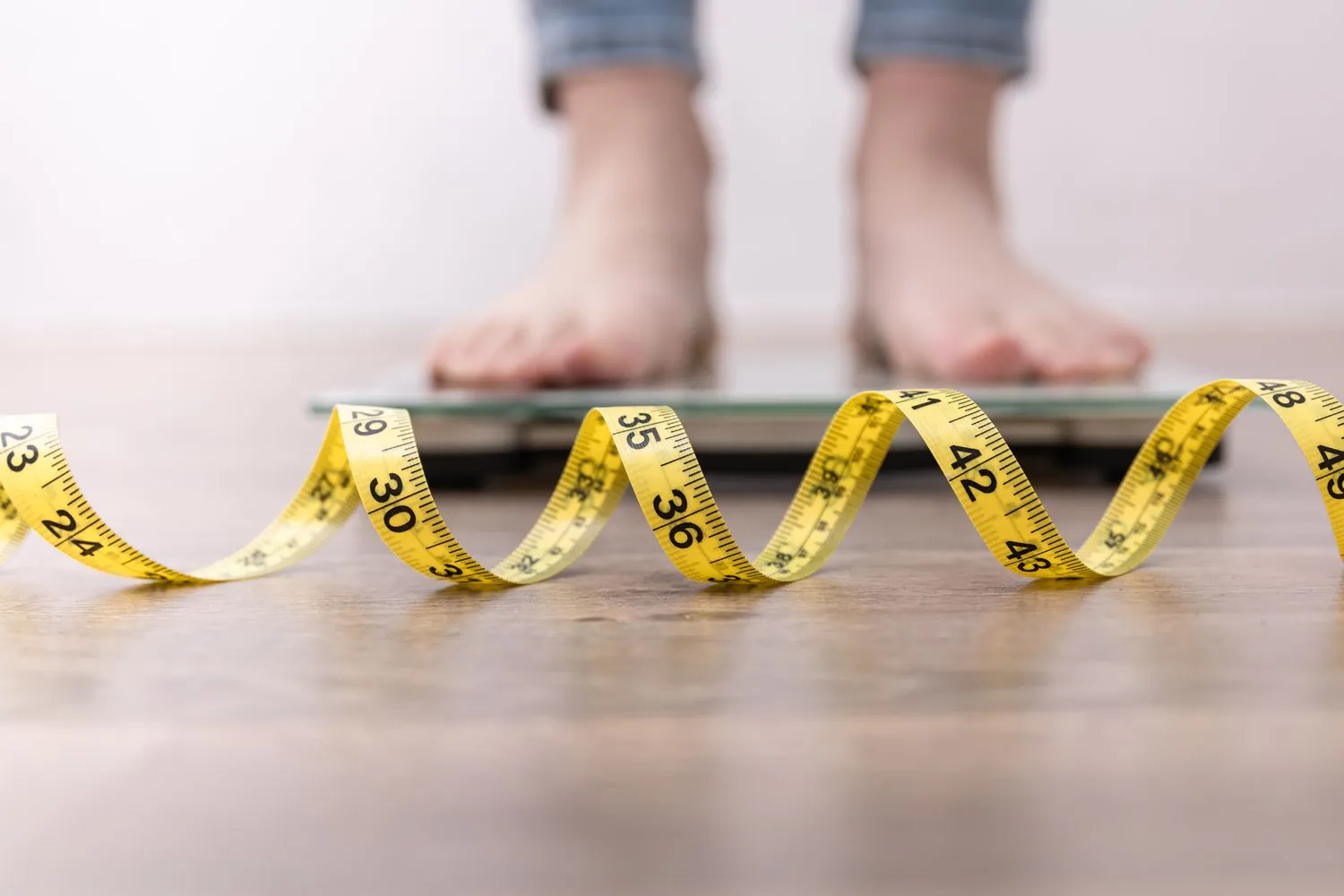
Tips for Elderly Adult Gain Weight
- Include liver, types of meat, types of legumes such as lentils, green peas, whole grain bread, milk and dairy products in the diet of the elderly.
- The elderly should have at least three snacks rich in protein and energy such as hard-boiled eggs, bread, dates, fresh, dried and cooked fruits, nuts such as almonds, walnuts, hazelnuts, dairy products such as milk, yogurt, cheese, curd, ice cream, rice pudding, and legumes such as lentils, etc.
- Use a variety of flavorings such as lemon juice, spices, seasonings, etc. to increase the appetite of the elderly.
- Add a tablespoon of healthy oils such as olive or canola oil to salads, vegetables and food for the elderly.
- Observe the variety of food in the daily diet plan of the elderly (using five food groups including meat and beans, eggs and nuts, milk and dairy products, fruits, vegetables and bread and grains)
- Use more bread and grains such as traditional whole grain bread, rice, pasta, puree food for elderly, and potatoes along with protein in the meals of the elderly.
- Pay more attention to breakfast and the use of nutritious ingredients such as walnuts and cheese in the breakfast of the elderly.
- Increase the consumption of whole grains and reduce the consumption of simple carbohydrates in the elderly’s daily diet.
- It is recommended to consume suitable amount of dairy products as well as foods and drinks enriched with vitamins and minerals (milk and buttermilk enriched with vitamin D).
- The elderly should drink 6-8 glasses of liquids (water, milk, tea, buttermilk, natural fruit juice, etc.) daily.
- They should regularly consume 2 to 4 portions of fruits and 3 to 5 portions of vegetables daily. In case of digestive and dental problems, it is better to consume fruits in the form of compote. Vegetables should be cooked with a little olive oil or various types of cheese for easier digestion and more energy.
To increase appetite in thin elderly, it is better to try these tricks to stimulate appetite in the elderly:
- Put the food of thin elderly people on a bigger plate.
- Use colored vegetables (carrots, tomatoes, bell peppers, etc.) next to the food plate.
- Eat food in the company of friends, relatives or family in a calm and happy environment.
- Elderly people should not drink water before or with food.
- Increase the number of meals and reduce the amount of food per meal.
Concluding Remarks
In conclusion, it can be said that the best foods for weight gain in elderly is a diet that is in line with the special needs of this period of life and helps to maintain general health and prevent age-related problems, such as heart diseases, diabetes and digestive problems. This diet should include rich sources of protein, fiber, vitamins and minerals. By following a balanced and regular diet, seniors can experience a more energetic and healthy life and improve their quality of life.

FAQs
What Foods Should Elderly Eat to Gain Weight?
- Fresh fruits and vegetables are rich in vitamins, minerals and dietary fibers.
- Whole grains such as whole-wheat breads, oats, and brown rice are good sources of fiber and B vitamins.
- Lean proteins such as skinless chicken, eggs and low-fat dairy and fish are excellent sources of protein.
- Low-fat dairy products such as yogurt, milk, and low-fat cheese are good sources of calcium and vitamin D.
- Eating small amounts of nuts and seeds can help provide healthy fats and protein.
What Is the Best Breakfast for Underweight Elderly?
A combination of oatmeal with fruit and nuts, eggs with vegetables, Greek yogurt with fruit and seeds, fruit and vegetable smoothies, and low-fat cottage cheese with whole-wheat bread is suitable for skinny senior breakfast.
